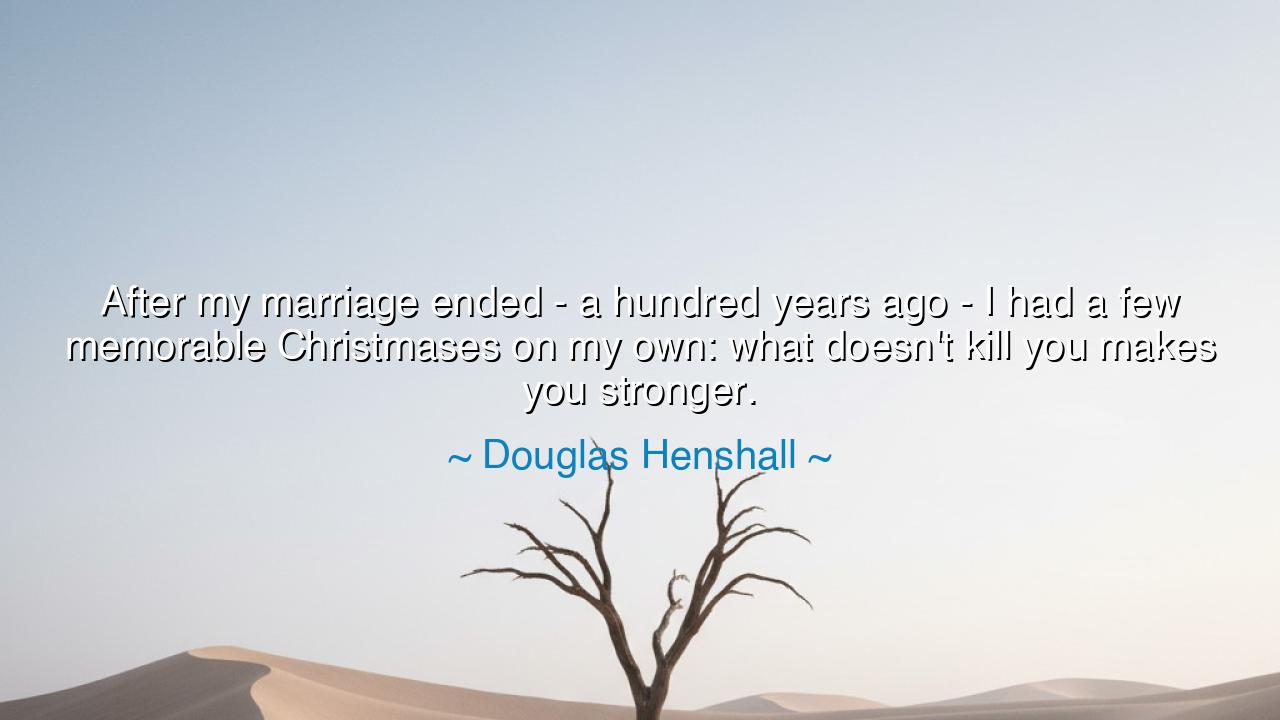
After my marriage ended - a hundred years ago - I had a few
After my marriage ended - a hundred years ago - I had a few memorable Christmases on my own: what doesn't kill you makes you stronger.






"After my marriage ended - a hundred years ago - I had a few memorable Christmases on my own: what doesn't kill you makes you stronger." These words, spoken by Douglas Henshall, reflect a powerful truth about the human condition: that through suffering, loss, and loneliness, we find the strength to endure and grow. Henshall’s reflection speaks not only of personal resilience but of the universal experience of overcoming hardship. The phrase, "what doesn't kill you makes you stronger," has echoed through the ages, suggesting that the trials of life, though painful, carry within them the seeds of growth and empowerment.
In the ancient world, the concept of suffering as a means of growth was often explored by philosophers and sages. Heraclitus, the Greek philosopher, famously stated that "character is destiny." He believed that the challenges we face—be they emotional, physical, or spiritual—are the very forces that shape who we become. His philosophy was not one of avoiding suffering, but one of embracing it as a vital part of the human journey. Much like Henshall, Heraclitus understood that suffering was not a force that weakened the soul, but one that, if confronted with courage, could strengthen it.
Consider the life of Odysseus, the great hero of Homer’s epic, The Odyssey. His journey was one of immense hardship—facing storms, battles, and the loss of his home and comrades. Yet, through it all, Odysseus grew in wisdom, resilience, and understanding. His return to Ithaca was not just the completion of a physical journey, but the culmination of a spiritual one, where each trial he faced made him stronger and more capable of overcoming the obstacles that awaited him. In this sense, Odysseus embodies the wisdom of Heraclitus—that what doesn’t kill you, but rather tests you, ultimately leads to growth.
Similarly, Henshall’s words about his own experience of being alone after the end of his marriage reflect a modern interpretation of this timeless principle. The end of a marriage—an event that can feel like the tearing apart of one’s identity and sense of self—is a profound loss. Yet, in Henshall’s case, that loss became the ground upon which he could build something stronger. He speaks of the memorable Christmases he spent alone, a reminder that solitude is not always an enemy, but can be a source of reflection, strength, and renewal. It is in these moments of isolation that we often discover the depths of our own resilience and resourcefulness.
The story of Nelson Mandela, who spent 27 years imprisoned for his fight against apartheid, offers a profound example of this principle. During his time in prison, Mandela endured physical and emotional suffering, yet it was through this very suffering that he forged the resolve to lead South Africa to freedom. He emerged from prison not as a broken man, but as a stronger and more focused leader, ready to carry the mantle of justice for his people. His experience exemplifies the truth that even in the darkest of times, suffering can be a crucible for strength and transformation.
There is, of course, a deep wisdom in the understanding that life is full of tests—the loss of loved ones, the pain of broken relationships, the trials that come with the passage of time. Yet, each challenge carries within it an opportunity for growth. It is not the absence of suffering that makes us strong, but our response to it. Henshall’s acknowledgment that the end of his marriage was a time of trial that ultimately led to strength echoes the ancient belief that character is forged in the fires of adversity. Like the blacksmith who hammers metal to shape it, life’s hardships mold us into the people we are destined to become.
The lesson we can take from Douglas Henshall’s reflection is one of courage and acceptance. When life presents us with challenges, we must not shy away from them, but face them with the knowledge that they are opportunities to grow. What doesn’t kill us does not simply leave us unchanged; it leaves us stronger, more wise, and more capable of facing the future. We must embrace the difficulties that life throws at us, not with fear, but with the understanding that we are always becoming something greater than we were before. The key is not to see ourselves as victims of our circumstances, but as warriors who, through every trial, are becoming stronger.
Let us take this wisdom into our own lives. When we face hardship, whether in love, in loss, or in personal growth, let us remember that strength is born of adversity. Instead of shrinking from the challenges that lie ahead, we must meet them with the courage to face them head-on, knowing that we are being shaped into the stronger versions of ourselves. In times of solitude or suffering, let us find the strength to grow, to learn, and to become the people we are meant to be. And in doing so, we will discover that even in our darkest moments, there lies the potential for the greatest of transformations.






AAdministratorAdministrator
Welcome, honored guests. Please leave a comment, we will respond soon